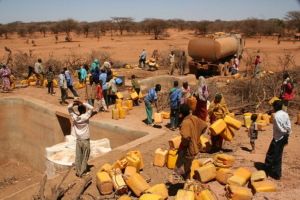News
Helping grassroots organisations to aid the world’s humanitarian crises
This article is more than 8 years old.
A new governmental fund has been set up to enable Danes to play a bigger part in ease the blight of the worst afflicted regions

The minister hopes to utilise the local connections and expertise of grassroots organisations (photo: filckr/Oxfam)
Denmark’s minister for development co-operation, Ulla Tørnæs, has announced the launch of a new emergency fund that grassroots organisations can use.
In 2017, money from the fund is expected to be used to help ease three of the world’s most serious humanitarian crises: the drought in Somalia, Yemen and northeastern Kenya, the south Sudanese refugee crisis, and the Syrian refugee crisis.
All of these have had a huge humanitarian effect on the surrounding countries.
READ ALSO: Millions in Danish aid heading to Horn of Africa
Tørnæs explained that “we need to mobilise more and new partners if we are to satisfy the enormous demand for humanitarian aid. This goes for both the private sector and Danish grassroots organisations that are organised in small groups. They often have important local knowledge and contacts and can operate quickly to save lives.”
A tidy sum
At the moment, there is around 42 million kroner in the Danish Emergency Relief Fund (DERF), and it is expected that about 25 million kroner will be added annually.
The fund will be administered by Civil Society in Development (CISU), which is an umbrella organisation for 280 Danish grassroots groups, along with Save the Children and the English NGO network START.
Making a difference
The minister went on to concede that “we can’t put out all of the worlds’ fires. But the humanitarian situation in both the Horn of Africa and the countries around Syria is becoming more and more desperate because of drought, famine, war and conflict.”
It is hoped that the fund will enable smaller NGOs to make a difference to the families affected and contribute to them being able to lead a normal life where they are.










































